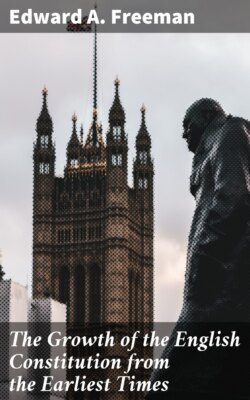The Growth of the English Constitution from the Earliest Times

Реклама. ООО «ЛитРес», ИНН: 7719571260.
Оглавление
Edward A. Freeman. The Growth of the English Constitution from the Earliest Times
The Growth of the English Constitution from the Earliest Times
Table of Contents
CHAPTER I
CHAPTER II
CHAPTER III
Footnote
CHAPTER I
CHAPTER II
CHAPTER III
Отрывок из книги
Edward A. Freeman
Published by Good Press, 2021
.....
“They choose their Kings on account of their nobility, their leaders on account of their valour. Nor have the Kings an unbounded or arbitrary power, and the leaders rule rather by their example than by the right of command; if they are ready, if they are foreward, if they are foremost in leading the van, they hold the first place in honour.... On smaller matters the chiefs debate, on greater matters all men; but so that those things whose final decision rests with the whole people are first handled by the chiefs.... The multitude sits armed in such order as it thinks good; silence is proclaimed by the priests, who have also the right of enforcing it. Presently the King or chief, according to the age of each, according to his birth, according to his glory in war or his eloquence, is listened to, speaking rather by the influence of persuasion than by the power of commanding. If their opinions give offence, they are thrust aside with a shout; if they are approved, the hearers clash their spears. It is held to be the most honourable kind of applause to use their weapons to signify approval. It is lawful also in the assembly to bring matters for trial and to bring charges of capital crimes.... In the same assembly chiefs are chosen to administer justice through the districts and villages. Each chief in so doing has a hundred companions of the commons assigned to him, as at once his counsellors and his authority. Moreover they do no matter of business, public or private, except in arms.”
Here we have a picture of a free commonwealth of warriors, in which each freeman has his place in the state, where the vote of the general Assembly is the final authority on all matters, but where both hereditary descent and elective office are held in high honour. We see also in a marked way the influence of personal character and of the power of speech; we see the existence of local divisions, local assemblies, local magistrates; in a word, we see in this picture of our forefathers in their old land, seventeen hundred years ago, the germs of all the institutions which have grown up step by step among ourselves in the course of ages. And a Swiss of the democratic Cantons would see in it, not merely the germs of his constitution, but the living picture of the thing itself.
.....